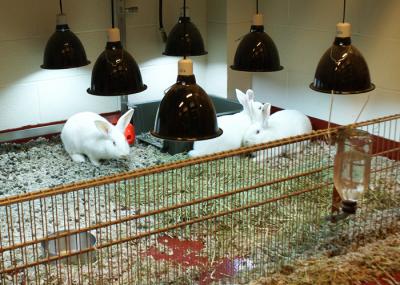Rabbits kept indoors could be vitamin D deficient

Regular exposure to artificial ultraviolet B light for two weeks doubled rabbits' serum vitamin D levels, the researchers found. Credit: Megan Watson
The study found that regular exposure to artificial ultraviolet B light for two weeks doubled rabbits' serum vitamin D levels – an increase not seen in animals raised in artificial light lacking UVB radiation.
Future studies will seek to determine optimal levels of UVB exposure and vitamin D levels in rabbits, guinea pigs, chinchillas and other animals.
A report of the study appears in the American Journal of Veterinary Research.
“We know that vitamin D is important to vertebrates in that it helps with calcium absorption, but it also has been shown to benefit cardiovascular health and immune function,” said Mark Mitchell, a University of Illinois veterinary clinical medicine professor, who led the research. “We know of several types of diseases that can develop with vitamin D deficiency. Some of the chronic problems we see are tooth-related.”
Other researchers have proposed that low vitamin D plays a role in dental disease in pet rabbits, Mitchell said.
“We are doing tooth trims and managing dental disease in rabbits, chinchillas and guinea pigs on a regular basis,” Mitchell said. “Weekly, we see those types of cases in our zoo medicine clinical service. It's something that also is seen across the country and internationally. It's a common problem.”
Most laboratory animals and many pet rabbits are not allowed outdoors because of the risks of exposure to predators, parasites and disease, Mitchell said. Windows block most UVB radiation. If the animals don't get sufficient vitamin D from their diet and are never exposed to ultraviolet light, they may become deficient, he said.
“As a clinician, I want to better manage these animals, give them a longer, higher quality of life,” Mitchell said.
Vitamin D deficiency also could undermine the validity of studies using rabbits in research to improve animal and human health, he said.
“In human medicine, they're starting to measure vitamin D levels as part of our routine medical exams,” he said. “But if we're not doing this with animals that we're using in research, we might be missing a step.”
Editor's notes: To reach Mark Mitchell, email mmitch@illinois.edu.
The paper, “Effects of Ultraviolet Radiation Produced From Artificial Lights on Serum 25-Hydroxyvitamin D Concentration in Captive Domestic Rabbits (Oryctolagus cuniculi),” is available online and from the U. of I. News Bureau.
Media Contact
All latest news from the category: Agricultural and Forestry Science
Newest articles

A universal framework for spatial biology
SpatialData is a freely accessible tool to unify and integrate data from different omics technologies accounting for spatial information, which can provide holistic insights into health and disease. Biological processes…

How complex biological processes arise
A $20 million grant from the U.S. National Science Foundation (NSF) will support the establishment and operation of the National Synthesis Center for Emergence in the Molecular and Cellular Sciences (NCEMS) at…

Airborne single-photon lidar system achieves high-resolution 3D imaging
Compact, low-power system opens doors for photon-efficient drone and satellite-based environmental monitoring and mapping. Researchers have developed a compact and lightweight single-photon airborne lidar system that can acquire high-resolution 3D…





















